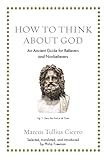How to think about God : an ancient guide for believers and nonbelievers / Marcus Tullius Cicero ; selected, translated, and introduced by Philip Freeman.
Material type: TextPublisher: Princeton, New Jersey : Princeton University Press, c2019Description: 1 online resource (xiv, 151 pages)Content type: text Media type: computer Carrier type: online resourceISBN: 9780691183657 ; 9780691197449Subject(s): Cicero, Marcus Tullius -- Translations into English | Scipio Aemilianus, P. Cornelius Africanus minor, 185 B.C. or 184 B.C.-129 B.C | Gods, Roman -- Early works to 1800 | Stoics -- Early works to 1800 | Theology -- Early works to 1800 | Cosmology, Ancient | Rome -- ReligionLOC classification: PA6307.A2 | F74 2019
TextPublisher: Princeton, New Jersey : Princeton University Press, c2019Description: 1 online resource (xiv, 151 pages)Content type: text Media type: computer Carrier type: online resourceISBN: 9780691183657 ; 9780691197449Subject(s): Cicero, Marcus Tullius -- Translations into English | Scipio Aemilianus, P. Cornelius Africanus minor, 185 B.C. or 184 B.C.-129 B.C | Gods, Roman -- Early works to 1800 | Stoics -- Early works to 1800 | Theology -- Early works to 1800 | Cosmology, Ancient | Rome -- ReligionLOC classification: PA6307.A2 | F74 2019 | Item type | Current location | Call number | Copy number | Status | Date due | Barcode |
|---|---|---|---|---|---|---|
 Books
Books
|
High School Learning Resource Center General Circulation | PA6307.A2 F74 2019 (Browse shelf) | 1 | Available | HS14303 |
Browsing High School Learning Resource Center shelves, Shelving location: General Circulation Close shelf browser
| No cover image available |

|
No cover image available |

|
No cover image available | No cover image available | No cover image available | ||
| PA 4025 A5E6 2007 The odyssey of homer / | The Odyssey of Homer | PA 4025.A5 .L3 1932 The Odyssey/ | PA 4167 R65 1984 Homer's The Odyssey / | PA6307.A2 F74 2019 How to think about God : an ancient guide for believers and nonbelievers / | PA 6807 A5 D75 1968 Virgil's Aenid / | PA 6807 A5 D75 1968 Virgil's Aenid / | PA 6807 A5 D75 1968 Virgil's Aenid / |
Includes bibliographical references
On the nature of the gods (2.1-44) -- The dream of Scipio
"The majority of Romans were a deeply religious people, though their religion took on forms most of us in the modern world would find unfamiliar. One of the most popular systems of belief among Roman as well as Greek thinkers was Stoicism. Although not strictly a religion Stoicism had many religious aspects including an understanding of the universe as a materialistic, yet continuous and living whole in which Stoics view both the gods and a supreme God as essential elements. This belief system is clearly expressed by Cicero in a central section of his book The Nature of the Gods, a work in which he has different Romans argue various positions on divinity at length. In How to Think about God(s), translator Philip Freeman presents a new translation of this central section which had tremendous influence on religious thinkers (Augustine, Thomas Aquinas, Dante, etc.) for centuries to come. He will also translate Cicero's famous text, The Dream of Scipio, which further articulates the Stoic position on divinity and human immortality. Taking these two fragments of Cicero's corpus of religious writings together, we have a succinct presentation of one of the most influential religious systems of the classical world. Cicero himself varied in his religious beliefs over his lifetime and never wholly embraced Stoicism, but he always admired its teachings and was deeply influenced by them. In these two works he explains fairly and even beautifully the ideas of Stoicism without committing himself to them. How to Think about God(s) is an illuminating illustration of what the key religious thinking was by one of the key religious Roman thinkers at the dawn of the Christian era"--
In English translation next to original Latin text ; introduction in English.


There are no comments on this title.